Submissions of 303rd Bomb Group related stories and articles are most welcome.



March 20, 2011
Volume III, Issue 3
www.303rdBG.com
by Sebastian L. Vogel
Part I
the assistance of the French underground, and his eventual return to England.
Copyright © Vogel Family, all rights reserved, used by permission.
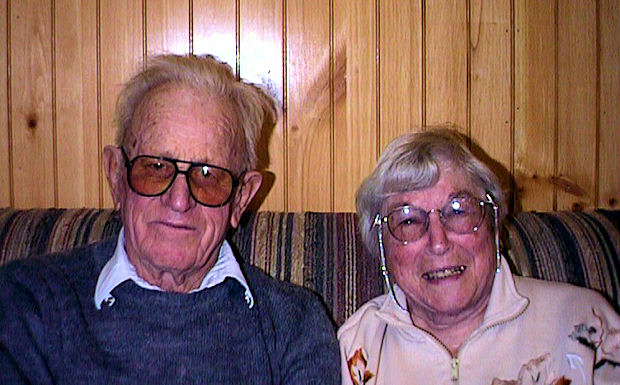
Sebastian and Kathleen Vogel in 1999. Sebastian passed away in 2007, Kathleen joined him in 2010.
"I am writing this for those of you that would like to share with me a few months of my life, a very long time ago."
I flew as first radio operator and machine gunner, with 9 other guys: pilot, co-pilot, navigator, bombardier, crew chief, ball turret gunner, tail gunner, and two side gunners. During the summer of 1942 we trained at Alamogordo, New Mexico, then at Biggs Field at El Paso, Texas. After leaving El Paso we went to Battle Creek, Michigan where we picked up 9 new B17s.
After checking them out we flew to Gander, Newfoundland. When we left Gander we flew to Prestwick, Scotland. After arriving in the British Islands we were sent to Molesworth up in the Midlands of England. We arrived at our English base in late September of 1942. By October we were flying raids on occupied France, where the Krauts had their submarine bases, St. Nazaire, Brest, and Lorient.
On January 23, 1943 we were called to make a raid on the Base at Lorient. Submarine Pens. After the briefing we were told that we would have to take another airplane because our ship was having supercharger problems. This was a bad omen to start with, I guess we didn't put much stock in omens anyway, but it was a little upsetting having to move our gear to another plane in a hurry.
We took off just a little after daylight and headed for Lands End, the southwestern most part of England where we were to rendezvous with several other squadrons of B17s. After the rendezvous we headed for Lorient, France. We were carrying two 2000 pound armor piercing bombs. The sky was overcast but I could see the ocean now and then. When we were on a raid we would receive a message from Wing Headquarters, the station was called PG3. They broadcast a message on the hour and on the half hour. It was my responsibility to receive the message and decode it and copy it into the ship's log.
Just as I sat down to copy the message for the fifth time I heard the Kraut flack burst and then they were coming pretty fast. I looked out both sides and I could see the black puffs of smoke from the shell explosions. Now it was time take position behind the top hatch gun. It was terribly cold up there that day, actually it was 70 degrees below zero. In order to put the top hatch gun in firing position I had to take the top hatch cover off. I turned the current up on my electric suit because I had to stand under the open hatch to fire the gun. The wind would blow right down on me in that position.
Now we were in Kraut territory so we had to keep watch for the Kraut fighters which would dive on us from out of the cloud cover.
As we neared the target at Lorient the flack was getting thicker, in fact as I looked out to the rear through the top hatch it looked like you could walk on it. At that time I saw one of our B17s go down. I still remember the sick feeling as It watched her go down because I did not see any of the crew bail out. Then I saw a Focke-Wulf (Kraut Fighter) blow up and saw the pilot bail out and disappear below.
Every gun on the ship was firing at fighters, they were all over us like flies. The side gunner and I were both firing at one fighter coming in on us at nine o'clock high, as we were firing I could see his wings smoke which meant he was also firing his guns, but apparently not at us. I could see our tracer bullets bouncing off the cowling of his engine. We must have damaged his ship because the last I saw of him his ship was disintegrating.
Shortly after that encounter I heard a loud thump on the side of our ship, then I heard the pilot feather the prop on one of the engines. As I looked out to rear of the ship through the top hatch, I could see that the vertical stabilizer (the big fin that sticks up on the back of the tail of the ship) was gone. Then the ship stated to climb, it kept on climbing, the engines roared as it climbed then it stalled out and went into a dive. I started for the bomb bay where I was to bail out.
Just as I opened the door to the bomb bay to go out on to the cat walk the extra gunner fell on me. I did not know if he had been shot. I was so concerned with getting out myself I did not try to be the hero and see if I could get him out or at least see if he had been wounded. It has bothered me over the years when I think of it that I should have tried to help him get out with me. I maybe could have saved his life if he were still alive when he fell. He went down with the ship. That's what I thought.
We did the bombing at 27,000 feet, which was high enough so that we needed oxygen to exist. When I went to the bomb bay I should have taken the emergency oxygen bottle, which was strapped on my leg, and opened it and put the tube in my mouth, but I forgot. When I got into the bomb bay I was having difficulty moving because of lack of oxygen.
When I finally got on the bomb bay catwalk the crew chief had just come down out of the upper turret and was pulling the release on the bomb bay doors. The doors opened up when he pulled the release, but blew back shut. As I was trying to pry the doors open I looked up and saw the copilot come down off the flight deck and go out through the front trap door.
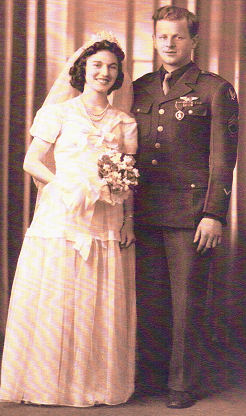 |
A strange feeling of peace came over me and the thought that it was not going to be so bad after all. I figured I wouldn't feel anything when we hit the ground. My thoughts wandered to back home. It bothered me that Kathie would probably feel bad and Mother and Dad and the rest would hear that I didn't make it and it would be like a funeral around home.
Then the crew chief remembered how to release the doors from the mechanical screws that powered the doors open when the bombardier was ready to drop the bombs. As he pulled this release mechanism the doors dropped open. As soon as the doors dropped open he went out.
All I can remember about getting out was the wind hitting me in the face and I could see that I was hanging out of the ship and my foot was caught in the door. The next thing I recall is that I was hanging in mid air, the ship was making a hell of a noise and heading for the ground. I knew that I had to pull the ripcord to get the chute open but I couldn't get my hand on the ring. My parachute harness was pulled around off to one side.
Kathleen and sister Roseann came to visit me while I was stationed in Battle Creek. We had a lot of fun when I could get away from the base. Their visit was great. After they left I had to go back to the base and get ready to leave with the squadron. While I was packing my gear I found one of Kathleen's white handkerchiefs in my blouse pocket. ‘Blouse" is what they called the uniform coat that went with the class A uniform. Evidently she gave it to me to put in my pocket one evening while we were at a dance. I was going to send it to her in a letter but I guess I thought, why not keep it.
One day when I was getting ready to go on a flight I tied the handkerchief to the ring on the parachute. Now back to where I was trying to find the rip chord ring with my harness pulled around so that the rip chord ring was actually almost around in back. When I tried to cram my neck around to see where the ring was I saw the white handkerchief I grabbed it.
I pulled it so hard that I ripped it clear out and I could see it flying off in the distance with the ring. My chute opened with a big bang like popping a paper back full of wind. At first I was swinging back and forth making a big arc. As I was swinging I could see our ship heading for the ground and it looked like it was about to hit. I didn't see it hit the ground because I looked the other way. I knew some of the crew were still in it.
Just as the ship crashed into the ground a Kraut fighter came so close to me I could smell the exhaust from the engine. He didn't bother me but he came in on the skipper (Robey) whom I could make out quite a ways below me. The Kraut fired a burst into the Skipper's chute then disappeared.
As I remember the ride down in the chute it was fascinating even though I was very scared and worried about the fighter. By this time I was down where it was much warmer and everything was quiet except for the wind whistling through the chute shroud line. When I got down to a few hundred feet from the ground the ground seemed to be coming up to me at a pretty fast rate. When I got to tree top height the earth seemed to come up and hit me.
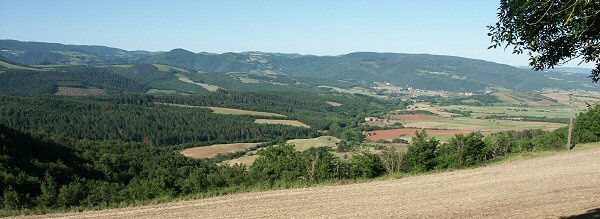
Châteaulin, Finistère, France area
When I hit I flexed my knees to reduce the impact as much as possible. My left leg was damaged in the ship before I got out. I tried to land as much as I could on my right leg but I still managed to break a bone in the mortise of my ankle. I landed in a small plowed field with a thick hedge around it on all sides. No one was near me in this field but I could see a crowd heading for the field across the hedge.
I could also see that a parachute was being collapsed in the field across the hedge from where I came down. When I managed to crawl through the hedge over to that field I recognized the guy that just landed, it was the crew chief. He landed just a few minutes before me. The ladies were all taking turns hugging and kissing him as he was pulling in his chute. He was pale as a ghost and air sick, the swinging in the chute when it popped open as he pulled the rip chord got to him.
He looked at me and said, "Where are we, in Ireland?" I have no idea why he thought we were in Ireland. Three Frenchmen began to help me replace my flying clothes with some of their civilian clothes. This was done to make it easier for them to help hide me if the Krauts happened to show up on the scene. We suspected that they knew where we landed and would soon show up around there. Fortunately for us the Krauts did not show up, but we got out of the area as soon as we could.
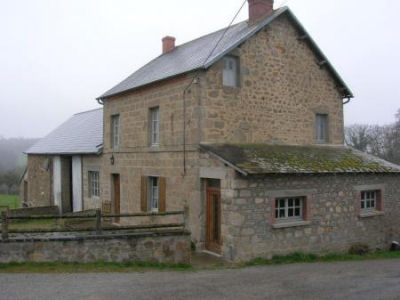 |
After leaving the area where we came down we walked about a half mile then stopped at a place along the road. The house was a house barn building which was owned by an elderly couple. The old woman was a very pleasant person, she had tears in her eyes as she hugged me and seemed to be happy for me making it to the ground in one piece. Apparently she had seen the action up in the sky and saw us get hit. Now I just began to realize that I was on the ground and still alive. It seemed like a moment of great joy that I had made it this far. I guess I even wept a little inside.
After this encounter with these nice people the crew chief and I talked between ourselves about the predicament we were in. We didn't know what part of the country we were in, we were pretty busy in the ship after leaving the target, plus getting out of the ship after it was hit that we lost track of our position. None of the natives we encountered so far could speak English and we could not speak French. Also we had to get under cover as soon as we could in case the Krauts were around looking for us.
I opened up my escape kit which all airmen carried on raids and took out the cloth map of France. I laid it out on the ground and tried to get one of the French guys to indicate on the map where we were. He showed me the general area on the map where we were, but the map was fairly large scale – that is lots of miles per inch of map.
It appeared to me that we were about 10 kilometers northeast of the city of Brest. One of the Frenchmen who seemed to be sort of a head man got rid of the people who had come over to look at us. We then walked for about a mile, my leg was getting worse and beginning to swell in the old boot that one of the guys had given me earlier.
We stopped at a barn house unit that seemed to be vacant. We went into the barn part and I laid down on some straw in one of the horse stalls. It was beginning to get dark and I dozed off. When I woke up there were three of us in the stall, the crew chief, the copilot and myself.
The copilot came down in the same general area as we did but we did not see him, he was about a mile from us. Some of the natives told him about us so they loaded him on a horse and brought him over to the barn where we were. His leg was in bad shape and he could not walk. We found out later that he had a twisted cartilage in his knee.
About an hour later we heard a knock at the door, naturally we thought it was the Krauts who would have had us dead to rights, we had no weapons. The crew chief finally opened the door at first all we could see was a horses head then we saw that there was a man on the horse which we soon recognized as our ball turret machine gunner. I was really glad to see him because I was sure that he had gone down with the ship. I did not see him come up from the ball turret when I was trying to get out of the ship. Now there were four of us in the barn.
A little later a Frenchman came back to the barn and indicated to us that they had found one of our fellows and that they had laid him out on a slab in the small funeral parlor near the local church. He conveyed the idea that he wanted one of us to come over there and see him and identify him.
The crew chief and the ball turret man went with the Frenchman. They saw that it was our skipper. He had a bullet enter his temple and come out at the lower part of his neck. We judged from this that he must have been killed instantly.
When I was coming down in my parachute the skipper was not very far away from me when the Kraut fighter came by me, then fired a few rounds at the skipper, which apparently got him in his chute before he ever hit the ground. The next morning the French people gave him a funeral mass and buried him near the church. They kept his wedding ring and watch which they said they would send to his family after the war if possible. The skipper's name was Robey. His home was near Salt Lake City, so I guess he was a Mormon. I am sure the Catholic funeral was okay anyway.
After the guys came back from funeral we talked for a while trying to put the whole thing back together from the time we got hit until we ended up in this horse barn house thing. A few of the French people mostly women and girls had come by to see us and look us over. I am sure we were quite a novelty in this community and no doubt everybody knew about us coming down there. None. of the folks could speak English but they all shook hands with us.
I finally went to sleep, cold as I was. I suppose I was so bushed. My bum leg seemed to be getting worse. So I did have some difficulty getting to sleep. I woke up about daylight the next morning. At that time a lady and a man came in with some coffee and some of their great bread. Real homemade wheat bread. They didn't slice the bread they just broke off chunks and put some butter on it and dipped it into the coffee.
When it was light enough so I could see fairly good, I rolled up my pants leg and looked at my leg. It looked like a big stick of summer sausage. The woman came over and looked at my leg, she seemed to be some sort of practical nurse. She had a plate with something that looked like butter on it. She spent about an half hour rubbing my leg with this butter like stuff and tried to tell me that my ankle bone was cracked, by using a stick to demonstrate.
On the second day a man, who was somewhat better dressed than the average native, came in and looked at my leg. I believe he was a real doctor. He wrapped my ankle and foot with a long stretch bandage which held my foot and ankle rigid. I got the notion from him that my leg was not as bad as I thought it was. Although I was much relieved about the seriousness of my injury, I still had much difficulty walking on it.
On the third day a man came in and told us that two strangers were seen in the little village asking the youngsters if they had seen any American soldiers around there. This fellow could manage some English and sort of conveyed the idea that it might not be too safe to hang around there too long.
We looked at the map for a while and somebody came up with the idea that we could go to Châteaulin and get a boat and try to get back across the channel. We knew that we had to leave as soon as possible, the Krauts were asking too many questions of the natives, especially the kids.
Our copilot was in no condition to be moved very far, he could not walk without a great deal of help. His name was 2Lt Mark L. McDermott, his home was Sioux Falls, South Dakota. He was not part of our regular crew. Burma, our regular copilot, was grounded when we took off on this raid because a throat infection.
The crew chief, the ball turret gunner and I were going to try for Châteaulin. The Frenchmen were going to try to get Mac into a local hospital. I walked a little ways with the guys, but it didn't take long to figure out that I was not going to make it, the bum leg wouldn't hold out. The guys tried to help me walk and insisted that I go along with them but I decided it was no use. My leg couldn't take it even with their help. They left without me after much discussion.
Now I was alone and began to feel it. It was very cold and getting dark, but I managed to head back to the barn on my own, taking it very slow. Before I got near the barn, it was almost dark and I could see several people with lanterns and flashlights walking around the small farmstead at the house barn we had just left.
I thought they might be Krauts so I headed for the hedge row. These hedges seemed to be hundreds of years old and spread out quite wide. I had not gone too far until my leg gave out so I crawled under the hedge hoping that if the Krauts were looking for me they might not find me because I was pretty well covered up by the top of the hedge, which was sort of like an umbrella.
My heart was pounding so hard. I figured that if these were Krauts and were anywhere near, they could hear it. I was beginning to feel a chill coming on, I still had my electric flying suit on under my French civilian clothes. of course there was no place to plug it in, but it was like a very heavy underwear union suit and it helped a lot even without electricity. I laid under the hedge for maybe an hour, my old pump was beginning to settle down, but I was getting the shivers.
Then I heard a noise which seemed to be someone crawling along the hedge row behind me. It was getting close and I was sure it must be a Kraut. Then I heard a female voice. She spoke the words that sounded like "Mon Cheri." She came along side of me. She had a thermos bottle in her hand. It was filled with wine that had been heated. She gave me a couple of cups of it, which I drank. This hot wine took the shivers away, boy how I needed that! She said a word or two which sounded like "soldier" and something else. She gave me a kiss (the usual French routine on one side then the other) and left. It was so dark I really never saw her face very clear, I know she was quite young and I like to think she was pretty. I have relived this tender moment many times. I was so cold and so scared and she helped me. What a gal!
Sometime before daylight I managed to get back to the barn. Mac was still there with a Frenchman. Mac could speak a little of the French language, he had studied a couple of years of French in high school. The next morning a fellow came by the barn with a couple of horses. Mac and I climbed on the horses and the Frenchman lead the horses down the road.
We came to the town of Pleyben in Finistère. I have no idea how far we rode these horses, but we were on them for more than an hour. This was the kind of a town where a lot of farmers lived. They lived in the town and walked out to their farms to do their work. There was no main street like you would find in a North Dakota town, just a street and houses.
We stopped at a small house with a slate roof owned by Madam and Monsieur Bernard Gilberte. They were an elderly couple. The man was a slim little man with a moustache, his wife was very pleasant looking and rather heavy. She seemed to be handicapped. She had a brace on one of her legs. She spoke some English words along with her French.
It was almost dark again. We sat by their fireplace and talked. The lady tried to tell me about when she was a young girl during WW1, she met an American officer. I don't really know what she was telling me, but Bernard was shooting some pretty heavy glances at her while she was telling me about it.
They had a fairly large chicken tied up by one foot in their entrance shed. They said we could stay up in their attic. They helped us up through the hatch into the attic. There were no windows up there, but there was a piece of glass laid in with the slate shingles so light came in and we could see down on the street. They had stored some potatoes up there and quite a lot of hedge clippings which they used for fire wood in the fireplace. Bernard would come up and bring some bread and some coffee for us.
Whenever the chicken laid and egg, they cooked it and brought it up to us. The days up in the attic were long and very boring. The first night we stayed with the Gilbertes we could hear the English bombing the sea port on the French coast about 5 miles away. We knew there was a raid on because we could hear the Kraut anti-aircraft guns before we could hear the engines on the planes. During the days I spent a lot of time looking out through glass onto the street below. Once in a while I would see the Krauts moving troops and equipment along the road.
A young lady from the town came up to see us on the third day. She was a nice looking blonde lady who lived in Pleyben. Her husband had been taken by the Krauts and put in a labor camp. The first day that she came up she brought a small steak, sort of Au jus, so to speak. This was the first real food, meat that is, that we had since we landed.
They were all very good about giving us bread and plenty of wine, but I am sure they were very short on food for themselves. Marie, the girl that I just referred to, came to visit us several times. She had an English to French dictionary, which we used to communicate with. We would spend an hour or so talking in this manner with her when she came to visit us. It was always good to see her, she helped pass time.
One day we were approached by a farmer from a few miles inland who supposedly had several acres of land and most of the labor was used up by the Krauts, so he wanted us to come and stay with him until after the war and help him run the farm. He said it would be impossible for us to get back to England anyway.
Neither Mac nor I were in any position to do anything but try to get healed up so we could at least walk. Mac's leg was not improving. On mine, the swelling and the sausage color had gone away and I could hobble around on it enough to get down by the fireplace with Bernard and his wife. As little as we could talk to each other, we still became good friends. I am sure that if the Krauts would have caught us in their house they would have gave them the firing squad. This didn't seem to bother them. At least they didn't show it. It most certainly did bother Mac and I.
During our stay with the Gilbertes, in their seventies, several local people came up in the attic and talked with us, including a fellow who seemed to be a medical doctor. One day after dark a fellow came up and spent some time with us, I noticed that Bernard was very nervous that evening while this fellow was there.
After the fellow had left I found why he was concerned. This fellow was the village barber, a nice guy and most likely not a Kraut sympathizer, but he talked too much. Most of the people that came up to see us assured us that they were tying to keep it quiet that we were up there in Bernard's attic.
The next night after dark we prepared to leave the Gilbertes. After much goodbyeing and the usual kissing and tears, we left and started to walk down towards out of town. This was a sad time. I had grown to like Bernard and his wife and really appreciated what a chance they took looking after us. They were such nice people.
Marie had come over to the Gilbertes to help us get out of the town. After we got out to the road Marie was helping me walk and a couple of the Frenchmen were helping Mac. Just as we got started, some trucks and equipment came rolling down the road. I think it was Krauts, but I really don't know. The Frenchmen must have thought so because they took Mac off the road into the bushes and Marie and I continued down the road. We must have looked like a couple of lovers. She had her arm around my shoulder trying to help me walk so that I wasn't limping. Anyway, the trucks never stopped and were soon out of sight.
A little further down the road we met a small truck that looked very much like a Model-A Ford. It was pulling a small trailer-type charcoal generator behind it. The charcoal gas that the trailer unit produced, was used to run the truck engine. We got in the truck after the usual goodbye routine with both the men and the women, we left Pleyben in the truck.
I will always remember Marie for her very strong like personality and her courage. She was a nice lady. In my correspondence after the war with these people I asked about Marie. Some time after we left the Gilbertes, perhaps at least a year after, she apparently got crosswise with the Krauts. The folks seemed reluctant to tell me what had happened to her.
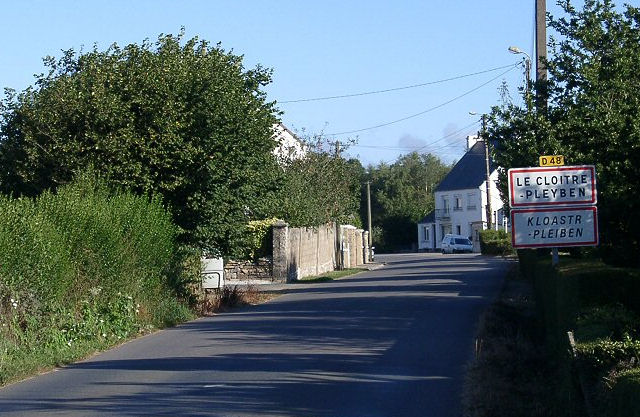
Le Cloitre, France
We traveled a few miles in the truck without incident to the town of Le Cloitre, a much larger town than Pleyben. We stopped at an apartment type building about three stories high.
We were taken into a basement room which was a commercial bakery. There were many large loaves of bread that had just been taken out of the oven and laid out on a long table. The baker was working with several ovens, he had a long pole with a large flat end which he used to reach way back into these large ovens and bring the loaves out.
The place brought back memories of home because of the smell of the newly baked bread. It reminded me of when we would come into the house on a cold winters day after we had been in the woods most of the day cutting logs or some other cold job and smell the fresh bread my Mother was baking. The baker could speak fairly good English and when he would speak to us in English he would talk very loud, when he spoke French to the others he talked very quiet like.
We were told that there were some tenants in the place that were Kraut sympathizers and they preferred that they did not know that we were there. So it scared me a little when he was speaking English so loud. His bread was terrific, he had cut into one of the large loaves which he shared with us. The Frenchmen were great on coffee dipping.
After the visit with the baker a very nice lady took Mac and I up to a room on probably the second floor of the building. We had to move very quietly through the narrow halls especially when we passed the room where one elderly woman was sleeping. She was a Kraut who had been married to a Frenchman. We never saw her but we managed not to disturb her.
The room they took Mac and I to had a large double bed with a very large feather pillow laying on it. The pillow covered the foot end of the bed, laying so that it covered about half of the bed. The linens smelled fresh like they had been washed in some kind of cologne water. This was the first time Mac and I had a chance to sleep in a bed since we landed in France, a real treat.
I slept most of the next day. When I got up the lady brought up a basin of hot water and a straight edge razor. It was no problem for me to shave with a straight edge razor because I had learned to shave with a straight razor when I first started to shave. My Dad used to keep it sharpened for me when I was home, but in the service I shaved with it until it got too dull to shave with, then I changed to a safety razor and blades. It sure felt good to get cleaned up again. Then after having a good nights sleep, things looked a lot better than they had for some time.
The next morning I was awakened by what sounded like ten head of cattle running down the street, the noise was being made by fifteen or twenty kids heading for school. The people in this part of the France wore wooden shoes. The streets in this town were not smooth concrete, they seemed to be made from fairly flat rocks laid in the concrete or mortar. Maybe these streets were cobblestone streets. Anyway, the kids sure made a racket on it with their wooden shoes.
That same day, in the afternoon the kids were returning home and they were singing some French song that was slightly familiar. Also they were making the same clattering sound on the street. I have forgotten how long we stayed at this house. I know I got pretty bored and tried to find my way down to the bakery, but before I got very far someone shoved me back into the room. The old lady who was supposed to be an Ex-kraut was already getting suspicious.
About 10:00 o'clock one night the people came into the room and told us we were going to have to get out of this town because two strangers were in the town asking the kids if they had seen any Americans.
Apparently the kids who were asked about us just got scared and ran. The young lady that was with the guy who seemed to be running the show tried to convey the notion that the kids didn't tell on us. I really don't think the kids knew we were there.
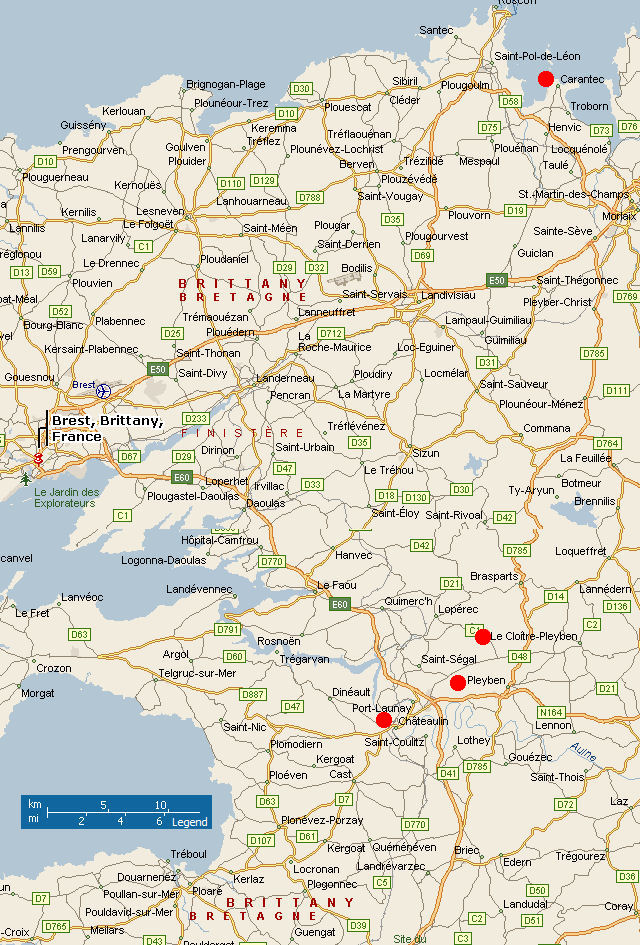
We got ready to leave and waited for them to come up to get us. This place had several women tenants who were wives of men that the Krauts had taken to labor camps or some other forced labor situation. Before we left, they took us into a room where there was a bed-ridden elderly woman (very old) who was probably the Grandmother of many of the women that were staying in the house.
She had a very impressive little Blessed Virgin shrine on the table next to her bed. She spoke very good English and she had a rosary in her hand. She said she was praying for safe journey. The younger women, four or five, were standing by the bed. The French custom saying goodbye by kissing on each cheek was practiced by both men and women, so Mac and I both said goodbye to the elderly women by bending over while she said goodbye. She had tears in her eyes when she said goodbye to me which moved me a lot. We repeated the same goodbye procedure with the others in the room who also seemed concerned for us. After this very emotional goodbye we left the through the bakery.
It was a clear night, but rather dark (no moon). Outside they had a two wheel cart hitched to one horse, they laid a canvas tarp on the bed of the cart and Mac and I crawled up and laid on the tarp then they folded the other end of the tarp up so that it covered us up head and all. Then they pulled the cart over under the hay loft door and tossed several forks full of clean straw on top of us.
Before they left the old Frenchman that seemed to be directing the operations came over to the cart and pulled the tarp over to uncover my head and said goodbye with the usual double kiss ceremony, he hadn't shaved for a couple of days. He wished us luck on our journey.
The cart and us, under the straw, left the town of Le Cloitre. The cart had no springs, so it was a rough ride over the cobblestones. I remember being scared as we rumbled along, because I expected the Krauts to pull us out from under the straw at any moment. We managed to get out of town without any trouble.
About a mile or so out of the town we met a truck. I thought it was strange that they took us out of the town under the straw in the cart at that time of the night. Who would be hauling straw at that time of the night? Perhaps they were mostly concerned that none of the towns people knew about us being there rather than concern for the Kraut Gestapo.
We crawled out from under the straw and transferred to the truck. The truck was a canvas covered type loaded with a lot of oyster baskets. These baskets were a 2' x 3' rectangle frame made of 2" x 6" lumber nailed together with a mesh screen nailed on the bottom. They had these baskets stacked across the rear of the truck bed so that they completely filled the back of the truck box. From the rear it looked like the truck was completely loaded with the baskets.
When they loaded the truck they left space in front of the truck box for us. They removed some of the baskets and Mac and I crawled into the front part and laid down on the floor of the truck box. They then piled the baskets back so again the truck looked like it was completely loaded. After some conversation which I didn't understand, the driver took off down the road. We were headed for the coastal town of Carantec. We had not gone far when we were stopped by Kraut patrols.
by Peter G. Park, Jr., Commander's Action Group
JIOCEUR Analytic Center
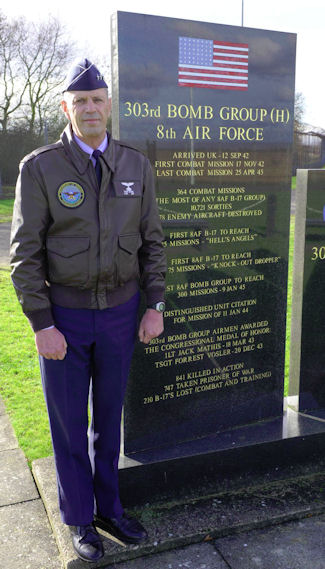 |
It was a very different 8th U.S. Air Force that then Brig. Gen. John C. Koziol served fifty-five years later as Vice Commander from December 2000 - August 2002. The modern aircraft and nuclear capabilities of today's 8th AF are beyond anything imaginable during the struggle against Nazi Germany in Europe during the war.
Visiting U.S. European Command, U.S. Africa Command, and NATO units at Royal Air Force Molesworth on February 14, 2011, now Lt. Gen. Koziol paused from his busy agenda to pay tribute to the 8,960 men who served in the Group during the war, and for 841 of which Molesworth - then known as Station 107 -- was the last place that they trod the earth.
The General reviewed RAF Molesworth units in his current roles as Deputy Under Secretary of Defense (Intelligence) for Joint and Coalition Warfighter Support; and as the Director of the Department of Defense Intelligence, Surveillance, and Reconnaissance Task Force, at the Pentagon, Washington, D.C.
![]()
360th Hardin Crew Gunner Honored After 66 Years
Hill Air Force Base, Utah – February 25, 2011
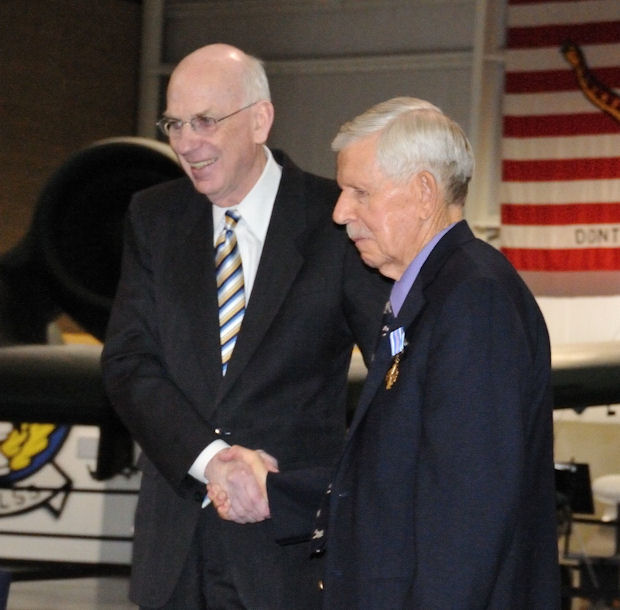
Sgt. Paul V. Sersland, waist gunner on the 1Lt Thomas H. Hardin, Jr. Crew, was honored Friday afternoon at the Hill Aerospace Museum, receiving the Distinguished Flying Cross Medal. The award was presented by Maj. Gen. Andrew Busch, Ogden Air Logistics Center commander, and former U.S. Sen. Robert Bennett before a large crowd at the museum's Lindquist-Hadley Fighter Gallery.
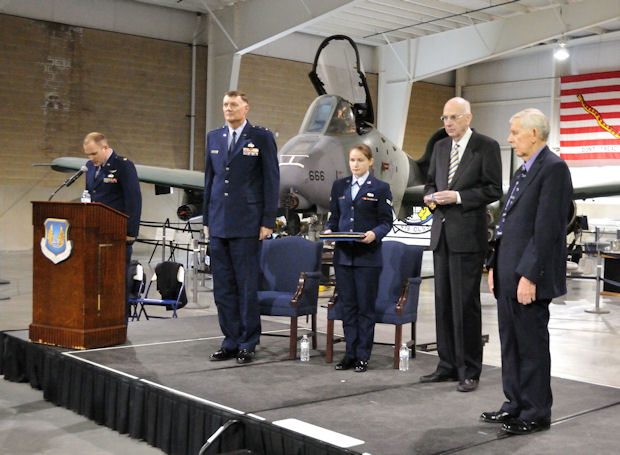
M/Gen Busch, Senator Bennett and Sgt. Sersland listen as Sersland's DFC Citation is read.
SPECIAL ORDER G-170, 10 August 2010, awarding Sgt. Sersland the Distinguished Flying Cross reads:
On this date while serving as Aerial Gunner on a B-17 assigned to the 360th Bombardment Squadron, 303rd Bombardment Group (Heavy), Sergeant Sersland distinguished himself by extraordinary achievement on many bombardment missions over enemy occupied Continental Europe in 1945. The professional competence, aerial skill, and devotion to duty displayed by Sergeant Sersland reflect the highest credit upon himself and the United States Air Force.
On Mission #306, January 22, 1945, targeting the Sterkrade, Germany synthetic oil plant, the 303rd BG formation encountered intense and accurate flak. One crew was lost over the target. Twenty-one aircraft received major flak damage and thee others minor damage.
B-17G #43-38672, flown by 1Lt Thomas H. Hardin, Jr., was hit by enemy fire. The aircraft was leaking fuel, and the No. 1 engine was knocked out and would not feather. The No. 2 engine had an oil leak, but managed to keep running. Fearing the prop might come off, the navigator and togglier were evacuated from the nose. As was normal procedure, Sersland helped Sgt. Harvey N. Kaber from his position in the ball turret. Hardin prepared his crew to bail out.
Hoping for the best, 1Lt Hardin decided to try to fly the Fortress back to England.
"We were hit so bad that we had to come out of formation," Sersland recalled. "We became a straggler, and stragglers were what Germans picked on."
The Hardin Crew limped back to Molesworth and made a safe landing. Fortunately, no crew member was injured or killed. The ground crew counted over 200 holes in their B-17, some as big as a softball.
Major Thomas H. Hardin was awarded the Distinguished Flying Cross for his heroic actions on this mission on June 26, 2003. Hardin and Sersland are the only surviving members of the crew.
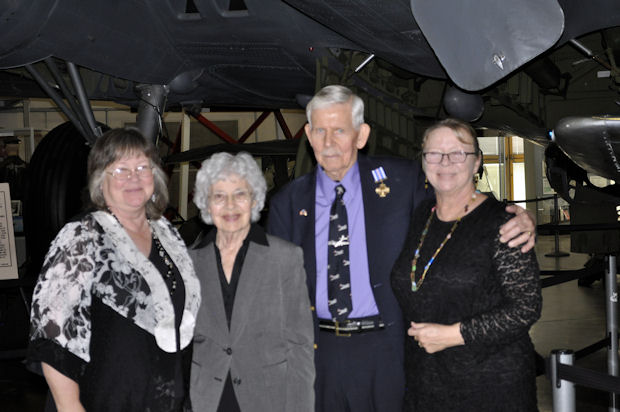
Paul Sersland and his wife Madeline with his daughters Linda Lowe (left) and Karolyn Ebbert (right).
"Even though this award is decades late," Senator Bennett said, "it's perfectly appropriate today that we recognize Sgt. Sersland."
When asked why it took so long for him to receive the award, Sersland simply replied, "Let's just call it administrative errors."
![]()
at the 8th Air Force Museum, Barksdale AFB, LA
Memorial Plaque Honors Major General Lewis E. Lyle
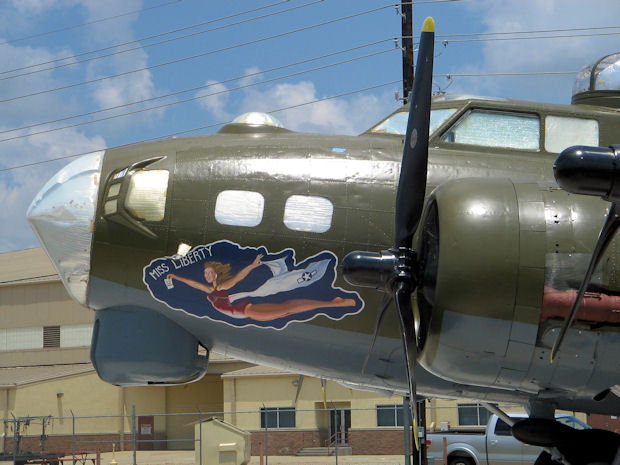
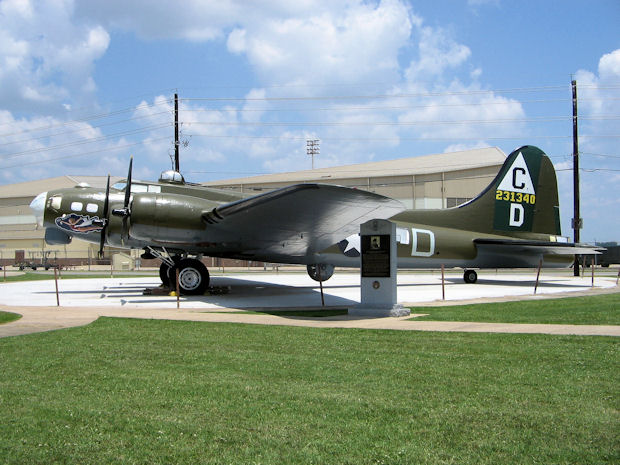
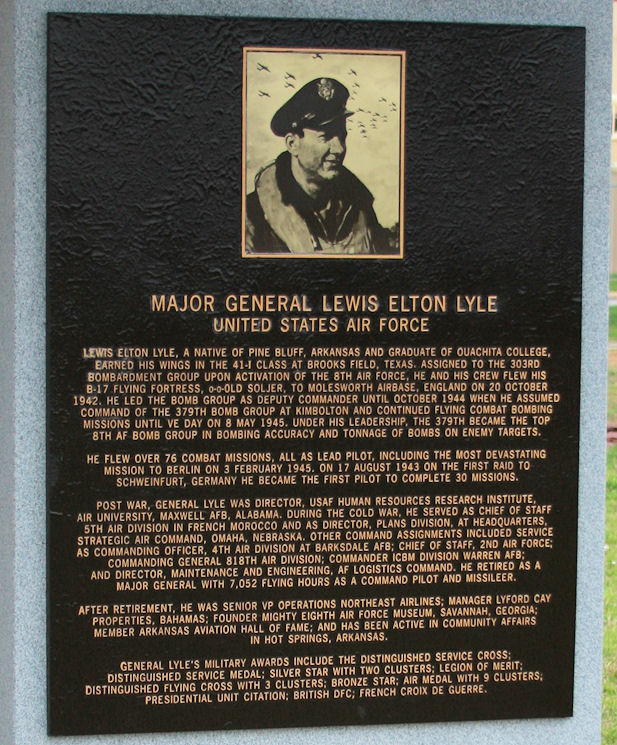
Now Available !
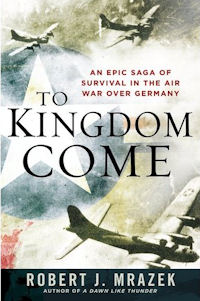 To Kingdom Come: An Epic Saga of Survival in the Air War Over Germany
To Kingdom Come: An Epic Saga of Survival in the Air War Over GermanyA new book by Robert J. Mrazek
On the morning of September 6, 1943, 338 B-17 “Flying Fortresses” of the American Eighth Air Force took off from England, bound for Stuttgart, Germany, where their mission was to bomb Nazi weapons factories. It was the largest force ever assembled against a single target in the war.
The British argued that conducting daylight bombing raids against heavily defended German military targets without long-range fighter escort would lead to crippling and unsustainable losses.
They were right.
Dense cloud cover obscured the industrial targets, and one commander’s critical decision to circle three times over the city—and its deadly flak—proved disastrous for the airborne crews. Forty-five planes went down that day, with hundreds of men lost or missing.
Not a single bomb fell on its intended target. The Stuttgart mission would become a defining moment in the conduct of the air war over Germany—one that underscored the courage and sacrifice of American flyers in the face of incredible odds.
Drawing on declassified documents, confidential diaries, and internal interviews of the top commanders—and focusing on gripping firstperson accounts of six of the B-17 airmen— award-winning author Robert J. Mrazek vividly re-creates the incredibly fierce air battle above Stuttgart and reveals the often astonishing valor of the airmen who survived being shot down— and the tragic fate of those who did not.
To Kingdom Come takes an in depth look at B/Gen Robert F. Travis, Commanding General of the 41st Combat Wing. Those interviewed for the book include the 303rd Bomb Group's Bud Klint, Bill Eisenhart and Don Stoulil, who flew the lead plane with General Travis on a mission to Berlin in 1944.
![]()
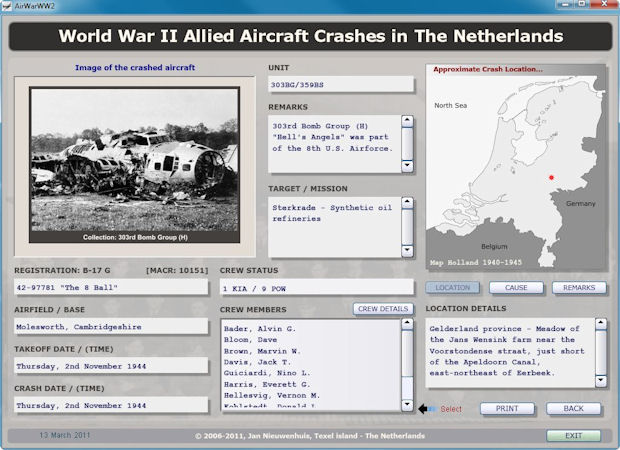
"World War II Allied Aircraft Crashes in the Netherlands"
On 1st February 2011 a new, and much more enhanced, version has been released of the "World War II Allied Aircraft Crashes in the Netherlands" software, made by Jan Nieuwenhuis from Texel island, The Netherlands.
The purpose of the program, which can be run on a Windows based PC, is to search for detailed information about Allied Aircraft Crashes in The Netherlands in the Second World War. It connects to the Internet to get the data, is very easy to use, and contains a lot of information. Not all crashes are listed yet, but the database is updated with new information on a continuous, almost daily, basis.
All retrieved data is listed in separate boxes or as listings on screen and a small photo of a crew member and/or aircraft may be shown (when available).
The software can be downloaded via http://airwar.texlaweb.nl and is free-of-charge. Any new information and/or updates for the database are highly appreciated by the author.
Farewell Old Friend . . .
TAPS Sounds for Dr. Walter E. Brown, Jr., Former President and CEO of the Mighty Eighth Air Force Heritage Museum and Long-time Eighth Air Force News Editor
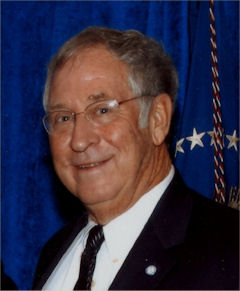 Dr. Walter Edward Brown, Jr., 71, died peacefully at his home in Spring Hill, TN, after a lengthy illness, on February 23, 2011.
Dr. Walter Edward Brown, Jr., 71, died peacefully at his home in Spring Hill, TN, after a lengthy illness, on February 23, 2011.
The son of late Dr. Walter Edward Brown and the late Neva Barber Brown, Walter was born and raised in Savannah, GA. He was a 1957 graduate of Savannah High School and a 1960 graduate of the University of Georgia where he was a member of Phi Delta Theta Fraternity. He received his medical degree from the Medical College of Georgia in 1964 where he was a member of Phi Rho Sigma. He was the fifth generation direct descendant in his family to graduate from the Medical College of Georgia where he has since served on the Foundation Board of Directors and received the 2007 Medical College of Georgia School of Medicine Distinguished Alumnus Award. He was instrumental in the $4 million renovation and restoration of the Old Medical College Building in Augusta, GA. He is a past President of the Medical College of Georgia Alumni Association.
Walter was the editor of the Eighth Air Force News for 12 years. He was Vice President of the Mighty Eighth Air Force Museum Board where he eventually served as the President and CEO of the Museum located in Pooler, GA. He was a lifetime member of the Eighth Air Force Historical Society. Walter was a member of the St. Andrews Society in Savannah, GA, and a member of the Savannah Oglethorpe Club.
He was the Sunday evening DJ for the Blues Radio Show on WRVU 91.1 at Vanderbilt University for two years. He served with the rank of Major in the United States Air Force from 1969 to 1971. Board certified OB-GYN, Walter practiced emergency medicine for thirty-five years at Baptist Hospital in Nashville, TN.
Surviving are his wife of 38 years, Alice Buchanan Brown of Spring Hill, TN; sons, Kerry Bertelle Brown and Kirk Buchanan Brown, both of Spring Hill, TN; sister, Sharon Brown Egan of Lilburn, GA; four nieces and one nephew.
There will be a visitation from 4-6 PM on Saturday February 26 at Fox and Weeks, Islands Chapel; 4605 Highway 80 East, Savannah, GA. The burial service is 2:00 PM Sunday, February 27 at Bonaventure Cemetery in Savannah, GA. A memorial service will be held in Franklin, TN at Parish Presbyterian Church at 11:00 AM on Wednesday, March 2, 2011; 136 3rd Avenue South, Franklin, TN. Donations can be made to the Medical College of Georgia Foundation at 1021 15th Street, Suite 6, Augusta, GA 30901; in memory of Walter Edward Brown Jr. Those wishing to donate to the Walter Brown Memorial Fund for the Mighty Eighth Air Force Museum in Pooler, GA can make donations in his name to First Farmers and Merchants Bank, PO Box 147, Spring Hill TN, 37174. SPRING HILL MEMORIAL FUNERAL HOME, 5239 Main St., Spring Hill, TN 931-486-0059.
![]()
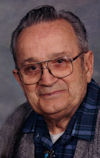 S/Sgt Ormal J. "Jack" Waffle passed on in his sleep Friday March 11th 2011.
S/Sgt Ormal J. "Jack" Waffle passed on in his sleep Friday March 11th 2011.
Dad proudly served in the 444th as an instrument specialist in the depot level repair and also recovered injured airmen as they returned form bombing missions. He joined the Illinois National Guard in 1938 and later transferred to the Army Air Corps. He deployed with his unit from California to New York. He actually arrived in England before B-17's got there and was part of the unit until deploying back to the States at the end of the war.
He was a hero to his family and we had many hours reliving his experiences during the war.
He will be greatly missed by his family.
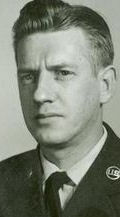
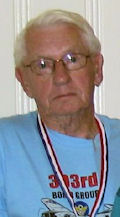 Harold R. "Red" Timm, 88, passed away on March 9, 2011, at Hospice of Northern Colorado. Harold was born on February 20, 1923, to Emil and Olga (Rosenberg) Timm in Gillett, Wisconsin. He married Alice Parker on December 25, 1947. They had two children, Michael Robert Timm and Katherine Mary Timm.
Harold R. "Red" Timm, 88, passed away on March 9, 2011, at Hospice of Northern Colorado. Harold was born on February 20, 1923, to Emil and Olga (Rosenberg) Timm in Gillett, Wisconsin. He married Alice Parker on December 25, 1947. They had two children, Michael Robert Timm and Katherine Mary Timm.
Harold was a B-17 tail gunner in the 360th Squadron of the 303rd Bomb Group, Army Air Corps (8th Air Force), during World War II. Based in Molesworth, England, he flew 10 missions, including the Schweinfurt Raid over Nazi Germany, before being grounded due to a ruptured eardrum. On a mission to Kassel, Germany, Harold's plane, the Upstairs Maid, ditched in the North Sea, making him a member of the Goldfish Club; the crew was picked up by the UK Air-Sea Rescue and all survived. After being grounded, he remained in Europe and became a gunnery instructor. Following a short break from the military after the war, he reenlisted in the U.S. Air Force, retiring as a Senior Master Sergeant after 20 years of service.
Like so many veterans, Harold did not talk about his war experiences until reconnecting with Eddie Deerfield, radio operator on Iza Vailable, during the 303rd Bomb Group reunion in Colorado Springs in 1995. He attended all but one reunion from 1995 until the final reunion in Washington, D.C., in 2007, serving as the organization's secretary from 2004-2007, and as hospitality room manager for many years.
While in the Air Force, Harold received the Outstanding Unit Award for one of the missions he flew during WWII, a Good Conduct Metal, and a Longevity Service Award.
After retiring from the Air Force in 1962, Harold and Alice owned and operated restaurants in Wisconsin, where they lived until moving to Colorado in 1985. Both avid golfers, they enjoyed many days on the links with family and friends, and travelled extensively throughout the United States.
In recent years, Harold made presentations about World War II to ROTC students at Colorado State University and history classes at Aims Community College, sharing his experiences as a tail gunner, discussing the missions he flew, and helping students understand that the "Price of Freedom is NOT Free."
Harold will be remembered for his love of family and country, courage, quick wit, sense of humor, and tenacity. He generously donated to organizations so that others less fortunate would have food on their tables, clothes for their families, and gifts for their children at Christmas. He also donated to numerous veterans' organizations and other charities.
Harold was preceded in death by his parents; sisters Jeannette Timm, Bonnie Timm and Margaret Beebe; brother Danny Timm; and his son, Michael Robert Timm. Survivors include his wife Alice; daughter Katherine Timm, son-in-law David Schaubert; brother Lloyd Timm; and sisters Mary Fromnes, Dorothy Zahn, and Betty Coleman.
Services will be held at 10 a.m. Monday, March 14 at the Allnutt Macy Chapel. Inurnment at Fort Logan National Cemetery, Denver. In lieu of flowers, memorial gifts may be made to Hospice of Northern Colorado in care of Allnutt, 702 13th St., Greeley, CO 80631.
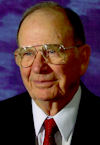 Jack D. Fischer, 88, of Fairfield, Texas, passed away March 7, 2011 in Fairfield. He was born November 23, 1923 in Fairfield to Benhard Fischer and Grace Davis Fischer.
Jack D. Fischer, 88, of Fairfield, Texas, passed away March 7, 2011 in Fairfield. He was born November 23, 1923 in Fairfield to Benhard Fischer and Grace Davis Fischer.
He is survived by his wife, Joy Aultman Fischer of Fairfield; daughter, Kay Ann Fischer of Philomath, OR; step-sons and wives, Gary and Debbie Gibson of Houston and Alan and Cathy Gibson of Wortham; step grandchildren, J. Alan Gibson Jr. of Carrollton and Kasi Wright and husband Sam of Wortham; step great granddaughter, Samantha Wright of Wortham and many cousins and friends. He is preceded in death by his parents and by his first wife, Jean Blalock Fischer.
Mr. Fischer graduated Fairfield High School in 1941. He entered the Air Force on February 16, 1943. After training he was assigned to the 303rd Bomb Group stationed in Molesworth, England. His plane was shot down over Germany on the 11th mission on August 15, 1944. He was taken prisoner at Prum. He remained a Prisoner of War for 8 1/2 months, including the 86 day 600 mile death march across the Baltic through frozen Poland. He was liberated May 2, 1945, and discharged on October 31, 1945 with the rank of Staff Sergeant. Medals he received during World War II are the: World War II Victory Medal, European Theatre of Operations, Good Conduct, Air Medal, Purple Heart and Prisoner of War Medal.
He graduated from Sam Houston University with a Bachelor of Science degree in 1949, and a Master of Education degree in 1952. He taught school in Cleveland, Texas and Texas City for 36 years. After retirement, he returned to Fairfield where he resided until his death. He was a member of Calvary Baptist Church, Fairfield Masonic Lodge for 60 years, Freestone County Historical Commission, Life Member of Veterens of Foreign Wars, Disabled American Veterans and American Ex-POWs Association. He enjoyed fishing, hunting, traveling and gardening, (he was a real outdoorsman and sportman).
Visitation will be from 6-8pm Wednesday at Griffin-Roughton Funeral Home. Funeral services will be 2:00pm Thursday at Calvary Baptist Church. Burial will follow at Fairfield Cemetery with Military Honors performed by the United States Air Force Honor Guard. Pallbearers are Warren Davis, George Davis, John Awalt, John Alan Gibson, Jr., Sam Wright, John David Aultman, John Fryer and Charles Burks. Honorary pallbearers will be Dr. John H. Keller, Lindale Phillips, O.B. (Spookie) Utley, Wayne Donaldson, Billie Ray Vestal, Jack Browder, Members of Masonic Lodge and Men of Pilgrim Sunday School Class at Calvary Baptist Church.
 Joseph C. Guerrieri, 88, of North Fort Myers died at Cape Coral Hospital Friday, Feb. 11, 2011. He was a retired Air Force Reserve captain and sales executive.
Joseph C. Guerrieri, 88, of North Fort Myers died at Cape Coral Hospital Friday, Feb. 11, 2011. He was a retired Air Force Reserve captain and sales executive.
Mr. Guerrieri served in the 8th Air Force 303rd Bomb group and flew 35 missions over Europe in World War II.
He is survived by three daughters, Anita Tiede, Elizabeth Callahan and Annie Smith; sister, Ursalina Fuhrer; four grandchildren; and four great-grandchildren.
 Alfred I. Smith, age 91, went to be with Our Lord Jesus on February 4, 2011. Al was born on April 23, 1919 in Denver, Colorado to Alfred E. and Luella M. Smith. Al is survived by his adoring sister Maybelle Smillie of Colorado Springs, brother-in-law Jim Bevans and sister-in-law, June Book, his sons; Joe(wife Phyllis) of Colorado Springs, and Jim(wife Yolanda) of Tucson, AZ , loving grandchildren; Eric, Esperanza , Brandon. Estevan, Breanna, and Geoff. Also great grandchildren; Cadence, Ezekiel, and Kadence, along with many nieces and nephews. Al's beloved wife Eileen recently proceeded him into Eternal life .
Alfred I. Smith, age 91, went to be with Our Lord Jesus on February 4, 2011. Al was born on April 23, 1919 in Denver, Colorado to Alfred E. and Luella M. Smith. Al is survived by his adoring sister Maybelle Smillie of Colorado Springs, brother-in-law Jim Bevans and sister-in-law, June Book, his sons; Joe(wife Phyllis) of Colorado Springs, and Jim(wife Yolanda) of Tucson, AZ , loving grandchildren; Eric, Esperanza , Brandon. Estevan, Breanna, and Geoff. Also great grandchildren; Cadence, Ezekiel, and Kadence, along with many nieces and nephews. Al's beloved wife Eileen recently proceeded him into Eternal life .
Al's growing up years were spent in Colorado and Oregon. He worked as a farm hand before joining the Army Air Corps and serving in World War II as a B-17 pilot in the European theater, including time as a prisoner of war. Later he had a distinguished career of 30 years as an Air Force NCO.
Al enjoyed hunting, fishing, camping and reading. Although a military career placed many demands on him, Al was devoted to his wife and children. He was a man of honest character known for his faithfulness, wit and humor. Al will be deeply missed by his loving family, relatives. and friends.
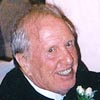 Harold John Walker, age 85, of Mt. Lebanon, formerly of Dormont, died peacefully surrounded by his loving family on Friday, February 25, 2011. Dearly beloved husband of 59 years to Margaret I. Walker; devoted father of Claudia Margaret Walker Mals, Dr. Mary Agnes Walker, John Albertson (Donna) Walker, Irene Marie (Edward) Petrarulo, Thomas Harold (Linda) Walker, Joan Maria (Paul) Mackey, and Patricia Maria (James) Connolly. Dearly loved and will be forever missed by his fifteen grandchildren, Michael Francis, Megan Anna, Laura Margaret (Shawn) Wickham, and Sarah Elizabeth Mals, William Harold Walker, Kathryn Marie, Michael John and Lauren Ann Petrarulo, Christopher Thomas, Caroline Margaret and Cameron Harold Walker, Brigid Anne, Paul Walker, Margaret Alice and Kathleen Marie Mackey; and one great-grandchild, Christiana Nevaeh Walker. He was preceded in death by his infant granddaughter, Erin Marie Mals.
Harold John Walker, age 85, of Mt. Lebanon, formerly of Dormont, died peacefully surrounded by his loving family on Friday, February 25, 2011. Dearly beloved husband of 59 years to Margaret I. Walker; devoted father of Claudia Margaret Walker Mals, Dr. Mary Agnes Walker, John Albertson (Donna) Walker, Irene Marie (Edward) Petrarulo, Thomas Harold (Linda) Walker, Joan Maria (Paul) Mackey, and Patricia Maria (James) Connolly. Dearly loved and will be forever missed by his fifteen grandchildren, Michael Francis, Megan Anna, Laura Margaret (Shawn) Wickham, and Sarah Elizabeth Mals, William Harold Walker, Kathryn Marie, Michael John and Lauren Ann Petrarulo, Christopher Thomas, Caroline Margaret and Cameron Harold Walker, Brigid Anne, Paul Walker, Margaret Alice and Kathleen Marie Mackey; and one great-grandchild, Christiana Nevaeh Walker. He was preceded in death by his infant granddaughter, Erin Marie Mals.
He was the son of the late Harold A. and Irene N. Walker and is survived by his brother Charles Joseph Walker, his sister Mary (Richard) VonStamwitz and nephew Joseph VonStamwitz. Mr. Walker was born in Brooklyn, New York on April 23, 1925. He attended St. Michael Catholic High School in Brooklyn.
Following graduation he enlisted in the U. S. Army Air Corps in June 1943. Mr. Walker was a Radar Mechanic with the 303rd Bombardment Group based at Molesworth, England. He was honorably discharged in 1945 with the rank of Sergeant. Upon discharge Mr. Walker attended St. John's University in New York City where he received a Bachelor of Science Degree. He enrolled at St. John's University School of Law and graduated with a Doctorate of Jurisprudence and was admitted to the New York State Bar Association.
In 1950, Mr. Walker entered the Federal Bureau of Investigation as a Special Agent and worked in several cities before his long term assignment in Pittsburgh, PA. During his almost thirty years of service in the FBI he became Supervisor for the Foreign Counter Intelligence Squad. In 1979 Mr. Walker became the Administrator of the Pittsburgh Office, Pennsylvania Department of Revenue. In 1983, Governor Richard Thornburgh appointed Mr. Walker as Deputy Secretary of Revenue for Enforcement for the Commonwealth of Pennsylvania. He served three years until his retirement from Commonwealth service. Mr. Walker continued to serve the U.S. Federal government as an independent contractor with the FBI and the U.S. Department of Defense until his 80th birthday. Mr. Walker was a thirty-year member of the Society of Former Special Agents of the FBI in which he was recently recognized by his peers.
Mr. Walker was a member of St. Pius X Roman Catholic Church in Brookline for over fifty years. For several decades he faithfully served as Treasurer of the St. Vincent DePaul Society and the Finance Council of the parish. Mr. Walker was a devoted husband for fifty-nine years. He and his beloved wife, Margaret, lovingly raised seven children. His life was truly fulfilled by spending time with his family, grandchildren, friends and neighbors in his home. His special interests were reading, classical music, history, and gardening. He will be remembered in the hearts of so many who loved, respected and admired him. He lived his life by faith in God, devotion to family and with Fidelity, Bravery and Integrity. Funeral arrangements by BEINHAUERS. 412-531-4000. Visitation will be held at Marian Manor in Green Tree, 2695 Winchester Drive, Pittsburgh, PA 15220, Building A, adjacent Assumption Chapel, on Sunday, February 27, from 2-8 p.m. Mass of Christian Burial will be celebrated in St. Pius X Roman Catholic Church on Monday, February 28, at 11 a.m.
Joseph A. Murphy, 96, of Tottenville, a World War II veteran and retired member of the International Longshoreman’s Union, died February 17, 2011 at home.
Born in Brooklyn, he was the youngest of the nine children.
He joined the U.S. Army in 1942 and was stationed in the European theater. As a member of the 303rd Bombardment Group’s Hells Angels, he served as an aerial gunner and bombardier on 28 missions in World War II to include two missions on D-Day in support of the Normandy invasion. Wounded in action, he was discharged from the Army Air Forces Convalescent Hospital in Fort Logan, Colo., in 1945. For his military service, Sgt. Murphy was awarded the Purple Heart.
Following his discharge, Mr. Murphy returned to New York and lived in Richmond Hill, L.I., before moving to Tottenville in 1959. An avid fan of the Brooklyn Dodgers, Mr. Murphy transferred his allegiance to the New York Mets and even rooted for the New York Yankees on occasion during the baseball season. His wife of 48 years, the former Mary Hubbard, died in 1992, and his son, Sylvester, died in 2006.
The funeral will be Wednesday from the Bedell-Pizzo Funeral Home, Tottenville, with a mass at 10 a.m. in Our Lady Help of Christians R.C. Church, Tottenville. Burial will follow in Resurrection Cemetery, Pleasant Plains.
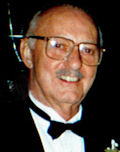 Raymond N. Calendberg, Born to Eternal Life June 16, 2010, age 87 years. Loving husband for 57 years of the late June E. Calenberg (nee Kohl). Beloved father of Susan (Steven Delaney) Calenberg, Thomas Calenberg and Mary (David) Juleen. Dear grandfather of Nicholas (Brenda) Juleen, Daniel (Missy) Juleen and Max Calenberg. Great - grandfather of Brinlee and Aliyah Juleen. Further survived by other relatives and friends.
Raymond N. Calendberg, Born to Eternal Life June 16, 2010, age 87 years. Loving husband for 57 years of the late June E. Calenberg (nee Kohl). Beloved father of Susan (Steven Delaney) Calenberg, Thomas Calenberg and Mary (David) Juleen. Dear grandfather of Nicholas (Brenda) Juleen, Daniel (Missy) Juleen and Max Calenberg. Great - grandfather of Brinlee and Aliyah Juleen. Further survived by other relatives and friends.
Raymond proudly served his country in the 8th Air Force during WWII. He taught at Pulaski High School for 27 years. His family would like to thank caregivers John Hawkins, Stephen Anderson, the staffs at St. Luke's and especially Zilber Family Hospice for all their loving care. Private services have been held. Memorials to Zilber Family Hospice. 414-961-1812 Jody Michael Armata
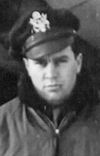 Colonel Andrew "Andy" K. Bentley, (US Army, Ret.) died Friday, February 18, 2011 at Richard Campbell Veterans Nursing Home, Anderson, SC.
Colonel Andrew "Andy" K. Bentley, (US Army, Ret.) died Friday, February 18, 2011 at Richard Campbell Veterans Nursing Home, Anderson, SC.
Colonel Bentley served his country with honor and pride. He flew bombing missions over Germany during World War II and served in the Korean War flying reconnaissance missions. Having served thirty one years in the military, Col. Bentley retired from the US Army Reserve.
While serving in the Army Reserve, he worked in the New York City Police Department. After twenty one years he retired with the rank of detective. He was then employed with Pan American World Airways as Vice President Audit and Security. He traveled the world of Pan Am routes.
A resident of Aiken since 1983, he was a communicant of St. Mary Help of Christians Catholic Church. Andy was a member of the Aiken Knights of Columbus Council #3684 and volunteered at ACTS.
He is survived by his wife, Bonnie Bentley, daughters, Kerry Rathbun, Tara Healy, Casey Farsetta, stepdaughter, Cynthia Gregoretti, stepson, Steve Gruber, grandchildren, and great grandchildren.
A Funeral Mass will be celebrated on Wednesday, February 23, 2011 at 11am at St. Mary Help of Christians Catholic Church. Interment will follow at 3pm in Fort Jackson National Cemetery, Fort Jackson, SC. GEORGE FUNERAL HOME & CREMATION CENTER is assisting the family.
Memorials may be made to the Knights of Columbus Scholarship Fund, 1003 Spaulding Dr, Aiken, SC, 29803 or to ACTS, 40 Park Ave, SW, Aiken, SC, 29801.
![]()
Dear Sir,Keeping the Legacy Alive,
Excuse for my bad English. Hope you will understand. On 22 April 1944 I saw a B17-G from 358 squadron, serial nr 42-39807, name Nero, coming from Hamm (Germany) crash above my head.After looking several years, I have for the moment the nanes of the crew; I saw them jumping out. Some of them were POW, others run away. Here are the names:
John SEDDON, C.D. BURKS, G.M. FITZPATRICK, J.C. HESS, W.A. MELDRICH, E.E. ROGERS, I.E. HOLCOMB, J. NEMCHICK, D.F. MALONEY, W.T. MUMMEREY.If family of these guys wish to have explanation, it will be a plesant to send it over. I send letters such as this several times to different adresses, but never had a answer. Please tell me something about this.
Much greetings,
Eric De Schryver,
250 Parmentierlaan
8300 Knokke : belgium
Hi Gary,
I was looking for some information related to my father, Walter D. Caldwell, when I came upon Volume II, Issue 14 dated September 30, 2010. In the Through the Lens section there is a photogragh with the caption 303rd BG Pathfinder Navigators – November 18, 1944 – Can you identify anyone? My father is in the bottom row (sitting) at the far left. My wife and I were going though some of his service papers recently and some references to "Mickey Operator". I knew my father was a navigator, but Mickey Operator was new to me. Anyway, I found the information I was looking for on your site and others. Thank you for keeping the memories of the 303rd alive.
Don Caldwell
Gary,
Just a short note to thank you for printing my request. I have been in contact with T/Sgt Jones neice and she directed me to his evasion report. We have been able to share information to help her update her family including Sgt Jones 95 year old sister. I also received an e-mail from the daughter of Eldon Ruppe the pilot of Hell Cat aka No Monkey Buisness who was shot down on the same raid as Sgt Jones and also escaped through the Pyrennes.
Thanks again
Bob Kidd
358th Morton Perkins Crew
I am attempting to identify S/Sgt Walter Beckwith in the photo of the Morton Perkins crew, that appeared in the February 2011 edition of The Molesworth Pilot. I would also welcome being in contact with the family of Walter Beckwith, along with any surviving members of the Perkins crew. Contact Marin Ennis at marin.ennis@gmail.com or at 1405 Dogwood Drive West Lawn, PA 19609-1011 (610) 678-2997.Thank you, Marin Ennis

|